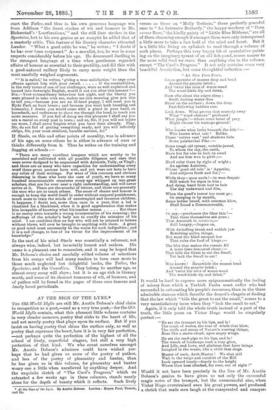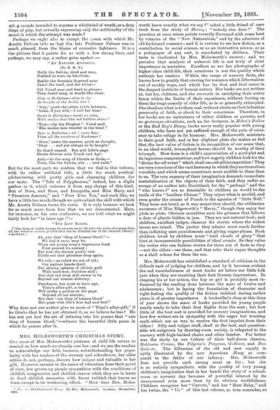AT THE SIGN OF THE LYRE.*
TILE Old-World Idylls are still Mr. Austin Dobson's chief claim to recognition as a poet,—and as a very true poet,—for the Old- World Idylls contain, what this pleasant little volume contains in very slender measure, poetry that sinks to the heart of life, and not merely poetry that plays upon its surface. Ent if you insist on having poetry that skims the surface only, as well as poetry that expresses the heart, here it is in very fair perfection, —not perhaps quite the perfection of the highest of all the school of lively, superficial singers, but still a very high perfection of that kind. We who count ourselves amongst Mr. Austin Dobson's admirers could have wished per- haps that he had given us more of the poetry of pathos, and less of the poetry of pleasantry and banter, than he has given us in this volume, for pleasantry and banter weary one a little when unrelieved by anything deeper. And the exquisite sketch of "The Cure's Progress," which we extracted a few weeks ago in these columns, stands nearly alone for the depth of beauty which it reflects. Such lively • At the Sign of the Lyre. By Austin Dobson. London: Regan Paul, Trench, and 0o.
verses as those on " Molly Trefasis," those perfectly graceful ones to "An Intrusive Butterfly," the happy mockery of " Dora versus Rose," the kindly gaiety of " Little Blue Ribbons," are all of them charming enough if amongst them were only interspersed a little more to take a fast hold of the mind and heart. But it is a little like living on syllabub to read through a volume of such pieces. Perhaps this very happy bit of speculative paint- ing on the imaginary tyrant of an old fish-pond, comes nearer to the more solid food we crave than anything else in the volume, except "The Care's Progress." It not only contains some very beautiful description, but some thoughtful reflection :-
" As OLD FISH-POND.
Green growths of mosses drop and bead Around the granite brink ; And 'twist the isles of water-weed The wood-birds dip and drink.
Slow efts about the edges sleep ; Swift darting water-flies Shoot on the surface ; down the deep Fast-following bubbles rise.
Look down. What groves that scarcely sway What " wood obscure " profound !
What jungle !—where some beast of prey Might choose his vantage-ground !
Who knows what lurks beneath the tide :— Who knows what tale ? Belike, Those antres vast' and shadows hide Some patriarchal Pike :- Some tough old tyrant, wrinkle-jawed, To whom the sky, the earth, Have but for aim to look on awed And see him wax in girth ;- Hard ruler there by right of might ; An ageless Autocrat, Whose good old rule' is Appetite, And subjects fresh and fat ; — While they—poor souls !—in wan despair Still watch for signs in him ; And dying, hand from heir to heir The day undawned and dim, When the pond's terror too must go ; Or creeping in by stealth, Some bolder brood, with common blow, Shall found a Commonwealth.
Or say, —perchance the liker this !- That these themselves are gone ; That Amurath in minimis,—
Still hungry, lingers on,
With dwindling trunk and wolfish jaw Revolving sullen things,
But most the blind unequal law
That rules the food of kings;—
The blot that makes the cosmic All A mere time-honoured cheat ;— That bids the Great to eat the Small, Yet lack the Small to eat !
....... . . Who knows ! Meanwhile the mosses bead Around the granite brink ; And 'twat the isles of water-weed The wood-birds dip and drink."
It would be hard to express more epigrammatically the feeling of misery from which a Turkish Pasha must suffer who had succeeded in exhausting his people's resources, than in the three admirable stanzas which describe the despot's chagrin at finding that the law which " bids the great to eat the small," comes to a very unsatisfactory issue when they "lack the small to eat."
Again, if it only told the whole truth instead of a part of the truth, the little poem on Victor Hugo would be singularly perfect :—
" He set the trumpet to his lips, and lo!
The crash of waves, the roar Of winds that blow, The strife and stress of Nature's warring things, Rose like a storm-cloud, upon angry wings.
He set the reed-pipe to his lips, and lo ! The wreck of landscape took a rosy glow, And Life, and Love, and gladness that Love brings Laughed in the music, like a child that sings.
Master of each, Arch-Master ! We that still Wait in the verge and outskirt of the Hill Look upward lonely—lonely to the height Where thou bast climbed, for ever, out of sight !"
Would it not have been precisely in the line of Mr. Austin Dobson's genius to have given us not only the successful magic notes of the trumpet, but the unsuccessful also, when Victor Hugo overstrained even his great powers, and produced a shriek that made men laugh at the exasperated and =taper-
stir g sounds intended to express a whirlwind of wrath,or a deep dirge of pity, but actually expressing only the artificiality of the mood in which the attempt was made ?
Perhaps we ought also to except the poem with which Mr. Austin Dobson tells ns that the late Professor Palmer was so much pleased, from the blame of excessive lightness. It is a fine picture that it paints for us with a few strong lines, and perhaps, we may say, a rather grim upshot :-
" AN EASTERN APOLOGUE.
(To H. H. P.)
Melik the Sultan, tired and wan, Nodded at noon on his divan.
Beside the fountain lingered near Jamil the bard, and the vizier—
Old Yasuf sour and hard to please; Then Jamil sang, in words like these.
Slim is Butheina—slim is she . As boughs of the Araka tree !
'Nay,' quoth the other, teeth between, 'Lean, if you will,—I call her lean.'
Sweet is Butheina—sweet as wine, With smiles that like red bubbles shine !
'True,—by the Prophet !' Ydsnf said. She makes men wander in the head !'
Dear is Butheina—ah ! more dear Than all the maidens of Sashmeer !
Dear,' came the answer, quick as thought, `Dear . . and yet always to be bought.'
So Jamil ceased. But still Life's page Shows diverse :into Youth and Age :
And,—be the song of Ghouls or Gods,— Time, like the Sultan, sits . . and nods."
But for the most part, we confess that we find in this volume, with its rather artificial title, a little too much poetical philandering with pretty girls and charming children for our taste. The "Tale of Polyphemus," indeed, has a slight pathos in it, which redeems it from any charge of this kind. But of Dora, and Rose, and Incognita, and Miss Mary, and " Premiers Amours," and " Poor Ill isa Tox," and such like, we have a little too much, though we quite admit the skill with which Mr. Austin Dobson turns his verse. It is only because we look for so much more from him that we are discontented. Here, for instance, on his own confession, we are told what we might fairly look for " in later age :"—
" THE LOST ELIXIR.
[' One drop of ruddy human blood puts more life into the veins of a poem than all the delusive aurum potabile that can be distilled out of the choicest library.' —LOWELL.]
Ah, yes, that drop of human blood !'- We had it once, may be, When our young song's impetuous flood- First poured its ecstasy ; But now the shrank poetic vein Yields not that priceless drop again.
We toil,—as toiled we not of old ; Oar patient hands distil
The shining spheres of chemic gold
With hard-won, fruitless skill; Bat that red drop still seems to be Beyond our utmost alchemy.
Perchance, but most in later age, Time's after-gift, a tear, Will strike a pathos on the page Beyond all art sincere; But that one drop of human blood' Has gone with life's first leaf and bud."
Why does not our author give us more of "Time's after-gift," if he thinks that he has yet obtained it as we believe he has ? He has not yet lost the art of infusing into his poems that " one drop of human blood,"—witness the beautiful little poem in which he yearns after it.



































 Previous page
Previous page